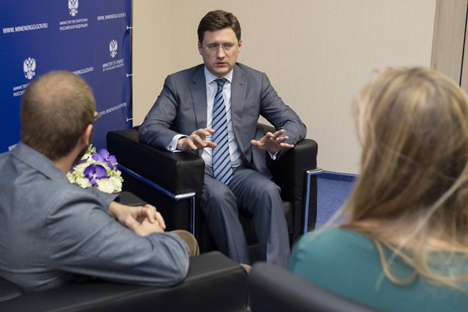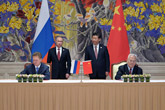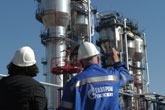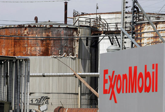Global markets are “closely intertwined” – Russian Energy Minister

Alexander Novak: "Without Russian energy resources Europe will not be able to provide for itself." Source: Sergei Kuksin / Rossiyskaya gazeta
The Russian delegation recently ended its visit to China, where both sides signed a record agreement for Russian gas supplies to the Chinese market. Can we say that the agreement was the result of the cooling of relations between Russia and its Western partners?
Relations with China are not connected with the events in Europe. We have a long stable relationship with China, and there are many intergovernmental committees, including the Energy Commission. Many agreements were signed during our scheduled visit to China, and I hope they will be the impetus for the further development of bilateral relations.
Is there, in your opinion, an objective alternative to Russian gas supplies to Europe? And how will American promises to supply Europe with U.S. gas factor into this?
That’s a baseless statement, without Russian energy resources Europe will not be able to provide for itself. They will only be able to reduce our share of deliveries after many years. Historically, Russia is rich in natural resources, and Europe is simply not. Moreover, by 2020, the total gas production in Europe will decrease by 100 billion cubic metres, i.e., a 20 percent. Any reduction in our deliveries will significantly increase prices. Currently, the U.S. has no excess gas either, and they haven’t passed any legislation on gas exports. Moreover, there are risks of increasing the domestic value of gas when gas is actively being delivered abroad. To our knowledge, so far only a decision has been made on the construction of terminals for the production of liquefied natural gas - totaling 9 million tonnes - and this gas will go mainly to Asian countries. Hardly anyone, including U.S. suppliers, is prepared to subsidize Europe on gas prices. Someone wants to reduce the share of Russian exports, but from an economic point of view this cannot be achieved, although we are ready to compete, in any case.
At what stage are the negotiations with the Ukrainian side?
At the moment, the negotiation process is underway with the European Commission, while Ukraine, since March, has failed to make payments for gas. The situation remains tense, and it worries us in terms of debt payment and the guarantee of gas supplies throughout Ukraine. In early May, we moved to a system of prepayment, but the issue of debt repayment must be solved together with the EU, which, among other things, should take responsibility for what is happening in Ukraine, as it supported the political changes in the country. If, by the summer, the necessary volume of gas is not pumped into underground storage facilities, the Ukrainian side can siphon it, even if it is intended only for European consumers. In general, our position is very clear: the Ukrainian side has obligations under the contract signed five years ago, and they should fulfill these obligations.
From the point of view of diversification of supply, what are the prospects of the South Stream project? Can it echo the success of Nord Stream?
The process is underway; the first gas should arrive in Bulgaria by December 2015. This project is very important for the Balkan countries. For them, this means a multi-billion investment, tax revenues, and gas transit, which will paid for by Russia. Of course, these countries are interested in the implementation of similar initiatives.
How competitive is Russia in terms of developing new technologies for the extraction of energy resources? How much do we depend on the West on this issue?
We are quite competitive. The Prirazlomnaya platform was commissioned in the Pechora Sea. This project is similar to Norwegian platforms that cannot operate in Arctic conditions, but it is unique, however, in that the weather is not problematic. Moreover, the first oil has already been sent to Rotterdam — so we are technologically prepared for the future. If we talk about Russia's dependence on the West, I believe that now we are all in the same boat as the world markets are closely intertwined. However, each country, including Russia, is looking for the best options for their economic opportunities and tender conditions. As an example of a Russian breakthrough technology project, you can look at the Lukoil offshore platforms project in the Caspian Sea, which is being constructed in Astrakhan.
From the perspective of the development of new technologies, I’d like to mention our Yamal LNG priority project. Will we be able to achieve the planned 6 percent of the LPG market, thus ousting Qatar and Australia?
Yamal LNG is just one of our priority projects. Apart from that, there are plans to build liquefied natural gas plants in Vladivostok, Sakhalin, and in the Leningrad region. The first phase of the 5 million tonne capacity Yamal plant is to be introduced in December 2015, and the state has contributed to this project in terms of allocation of funds for infrastructure. Accordingly, the share of Russia in the LNG market will increase. Only Yamal LNG will increase its output by 15 million tonnes of LNG. Now we produce 10 million tonnes, so the increase will be doubled. When the rest of the projects are implemented, the total LNG production will reach 60 million tonnes. This production will be implemented, among other countries, in China, India and Japan.
All rights reserved by Rossiyskaya Gazeta.
Subscribe
to our newsletter!
Get the week's best stories straight to your inbox


